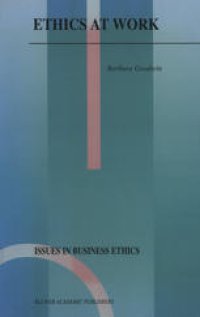
Ebook: Ethics at Work
Author: Barbara Goodwin (auth.)
- Tags: Ethics, Ontology, Human Resource Management, Management/Business for Professionals
- Series: Issues in Business Ethics 16
- Year: 2000
- Publisher: Springer Netherlands
- Edition: 1
- Language: English
- pdf
What would tempt you to whistleblow? Do Codes of Conduct make organisations ethical? How do people react to taking the blame for others? This book answers such questions, drawing on the views of employees in eight large organisations. One finding is the `whited sepulchre phenomenon': an organisation which presents a squeaky-clean image to the world but has intrinsic failings which cause moral dilemmas for staff. While treatment of customers is regulated by Codes and Charters, internal organisation is typically more anarchic. The study also exposes the moral conflicts generated by party-political machinations in organisations with democratic governance.
The book offers a unique perspective on ethical attitudes at work and reactions to responsibility and accountability. It finds that, although religious belief is declining, strong moral beliefs still thrive and `ethical employees' abound. It highlights the importance of empowerment, procedures, and professionalism in creating the `moral organisation'. This original study will interest practitioners in business, the public sector and NGOs, especially human resources professionals, as well as philosophers and business ethicists.
What would tempt you to whistleblow? Do Codes of Conduct make organisations ethical? How do people react to taking the blame for others? This book answers such questions, drawing on the views of employees in eight large organisations. One finding is the `whited sepulchre phenomenon': an organisation which presents a squeaky-clean image to the world but has intrinsic failings which cause moral dilemmas for staff. While treatment of customers is regulated by Codes and Charters, internal organisation is typically more anarchic. The study also exposes the moral conflicts generated by party-political machinations in organisations with democratic governance.
The book offers a unique perspective on ethical attitudes at work and reactions to responsibility and accountability. It finds that, although religious belief is declining, strong moral beliefs still thrive and `ethical employees' abound. It highlights the importance of empowerment, procedures, and professionalism in creating the `moral organisation'. This original study will interest practitioners in business, the public sector and NGOs, especially human resources professionals, as well as philosophers and business ethicists.
What would tempt you to whistleblow? Do Codes of Conduct make organisations ethical? How do people react to taking the blame for others? This book answers such questions, drawing on the views of employees in eight large organisations. One finding is the `whited sepulchre phenomenon': an organisation which presents a squeaky-clean image to the world but has intrinsic failings which cause moral dilemmas for staff. While treatment of customers is regulated by Codes and Charters, internal organisation is typically more anarchic. The study also exposes the moral conflicts generated by party-political machinations in organisations with democratic governance.
The book offers a unique perspective on ethical attitudes at work and reactions to responsibility and accountability. It finds that, although religious belief is declining, strong moral beliefs still thrive and `ethical employees' abound. It highlights the importance of empowerment, procedures, and professionalism in creating the `moral organisation'. This original study will interest practitioners in business, the public sector and NGOs, especially human resources professionals, as well as philosophers and business ethicists.
Content:
Front Matter....Pages i-ix
Moral Questions....Pages 1-6
Ethos or Code?....Pages 7-53
Personal Morality at Work....Pages 55-116
Topical Ethical Questions....Pages 117-144
Responsibility at Work....Pages 145-182
The Moral Organisation....Pages 183-234
Back Matter....Pages 235-253
What would tempt you to whistleblow? Do Codes of Conduct make organisations ethical? How do people react to taking the blame for others? This book answers such questions, drawing on the views of employees in eight large organisations. One finding is the `whited sepulchre phenomenon': an organisation which presents a squeaky-clean image to the world but has intrinsic failings which cause moral dilemmas for staff. While treatment of customers is regulated by Codes and Charters, internal organisation is typically more anarchic. The study also exposes the moral conflicts generated by party-political machinations in organisations with democratic governance.
The book offers a unique perspective on ethical attitudes at work and reactions to responsibility and accountability. It finds that, although religious belief is declining, strong moral beliefs still thrive and `ethical employees' abound. It highlights the importance of empowerment, procedures, and professionalism in creating the `moral organisation'. This original study will interest practitioners in business, the public sector and NGOs, especially human resources professionals, as well as philosophers and business ethicists.
Content:
Front Matter....Pages i-ix
Moral Questions....Pages 1-6
Ethos or Code?....Pages 7-53
Personal Morality at Work....Pages 55-116
Topical Ethical Questions....Pages 117-144
Responsibility at Work....Pages 145-182
The Moral Organisation....Pages 183-234
Back Matter....Pages 235-253
....